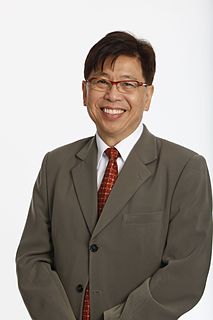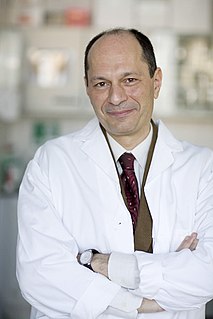A radiation therapist, therapeutic radiographer or radiotherapist is an allied health professional who works in the field of radiation oncology. Radiation therapists plan and administer radiation treatments to cancer patients in most Western countries including the United Kingdom, Australia, most European countries, and Canada, where the minimum education requirement is often a baccalaureate degree or postgraduate degrees in radiation therapy. Radiation therapists can also prescribe medications and radiation, interpret tests results, perform follow ups, reviews, and provide consultations to cancer patients in the United Kingdom and Ontario, Canada . In the United States, radiation therapists have a lower educational requirement and often require postgraduate education and certification in order to plan treatments.

In the field of medical treatment, proton therapy, or proton radiotherapy, is a type of particle therapy that uses a beam of protons to irradiate diseased tissue, most often to treat cancer. The chief advantage of proton therapy over other types of external beam radiotherapy is that the dose of protons is deposited over a narrow range of depth, which results in minimal entry, exit, or scattered radiation dose to healthy nearby tissues.
The Children's Oncology Group (COG), a clinical trials group supported by the National Cancer Institute (NCI), is the world's largest organization devoted exclusively to pediatric cancer research. The COG conducts a spectrum of clinical research and translational research trials for infants, children, adolescents, and young adults with cancer.
The National Wilms Tumor Study Group (NWTS) is a cancer research cooperative group in the United States formed to study a type of kidney tumor that affects children called Wilms' tumor. In 2001, NWTS merged with several other pediatric oncology cooperative groups to create the Children's Oncology Group (COG). However, the NWTS is still active in name today completing follow-up of the late effects of treatment for patients previously enrolled in its trials. The acronym NWTS is pronounced like the word "nitwits".

SWOG is a National Cancer Institute (NCI) supported organization that conducts clinical trials in adult cancers.
The Intergroup Rhabdomyosarcoma Study Group (IRS) was a U.S. and Canadian clinical trial cooperative group created with the mission of studying childhood cancers. In 2000, IRS merged with several other pediatric cooperative groups to form the Children's Oncology Group (COG). This merger has seen its fair share of problems, especially with regard to integrating the various databases associated with each individual cooperative group. One such initiative to consolidate these databases involves caBIG, or cancer BIG, which is guided and supported by the National Cancer Institute (NCI) in Bethesda, Maryland. They published a report on cancer treatment protocols published by the National Institute of Health in 2001, and a separate report in 2011 on improving outcomes for patients with low-risk embryonal rhabdomyosarcoma.

The European Organisation for Research and Treatment of Cancer (EORTC) is a unique pan-European non-profit clinical cancer research organisation established in 1962 operating as an international association under Belgium law. It develops, conducts, coordinates and stimulates high-quality translational and clinical trial research to improve the survival and quality of life of cancer patients. This is achieved through the development of new drugs and other innovative approaches, and the testing of more effective therapeutic strategies, using currently approved drugs, surgery and/or radiotherapy in clinical trials conducted under the auspices of a vast network of clinical cancer researchers supported by 220 staff members based in Brussels. The EORTC has the expertise to conduct large and complex trials especially specific populations such as the older patient and rare tumours.
The Imaging and Radiation Oncology Core (IROC) is a center for the evaluation of data produced by clinical trials funded by the National Cancer Institute, as part of the National Clinical Trials Network "to provide integrated radiation oncology and diagnostic imaging quality control programs...thereby assuring high quality data for clinical trials designed to improve the clinical outcomes for cancer patients worldwide."

Cancer and Leukemia Group B is a cancer research cooperative group in the United States.

The Brooklyn Hospital Center is a 464-licensed-bed, full-service community teaching hospital located in Downtown Brooklyn, New York City. The hospital was founded in 1845. It is affiliated with the Mount Sinai Health System, and serves a diverse population from a wide range of ethnic backgrounds.
The University of Maryland Marlene and Stewart Greenebaum Comprehensive Cancer Center (UMGCCC) is a National Cancer Institute (NCI)-designated comprehensive cancer center located in Baltimore, Maryland.

Edison T. Liu, M.D., is the president and CEO of The Jackson Laboratory, and was the president of Human Genome Organization, HUGO from 2007-2013.
The Alliance for Clinical Trials in Oncology is a national clinical trials network sponsored by the National Cancer Institute (NCI) that consists of about 10,000 cancer specialists at hospitals, medical centers, and community clinics across the United States and Canada. The Alliance develops and conducts clinical trials with promising new cancer therapies, and utilizes scientific research to develop treatment and prevention strategies for cancer, as well as researching methods to alleviate side effects of cancer and cancer treatments.
Professor Minesh P Mehta, MD, FASTRO, is an American radiation oncologist and physician-scientist of Indian origin, Ugandan birth, Zambian Schooling and American Training, who contributed to the field of oncology for more than two and half decades.

Childhood cancer is cancer in a child. In the United States, an arbitrarily adopted standard of the ages used are 0–14 years inclusive, that is, up to 14 years 11.9 months of age. However, the definition of childhood cancer sometimes includes adolescents between 15–19 years old. Pediatric oncology is the branch of medicine concerned with the diagnosis and treatment of cancer in children.
Christopher M. Nutting is a British Professor of Clinical Oncology and medical consultant, specializing in head and neck cancers, who has helped develop Intensity-Modulated Radiotherapy (IMRT), an advanced form of Radiation therapy.
Joaquín Gómez Mira is a scientist and physician specialized in radiation oncology. Born and raised in Spain, he completed his studies and developed his career in the United States, where he moved in 1967. He is a member of the American Society of Clinical Oncology, and a Fellow and appointed councilor of the American College of Radiology. His work, achievements and lectures in the field of radiation oncology are held in high regard.

Marco Durante is an Italian physicist, recognized as an expert in the fields of radiobiology and medical physics in charged particle therapy.
Deborah Watkins Bruner is an American researcher, clinical trialist, and academic. She is the senior vice president for research at Emory University. Her research focus is on patient reported outcomes, symptom management across cancer sites, sexuality after cancer treatment, and effectiveness of radiotherapy modalities. Bruner's research has been continually funding since 1998, with total funding of her research exceeding $180 million. She is ranked among the top five percent of all National Institutes of Health-funded investigators worldwide since 2012, according to the Blue Ridge Institute for Medical Research.
Caridad Borrás is a Spanish medical physicist. Her career started in 1964 at the Santa Creu i Sant Pau Hospital in Barcelona, as a medical physicist. From 1988 to the year 2000 she was Regional Advisor of the Radiological Health Program and from 2000 to 2002,Coordinator of Essential Drugs and Technology at the Pan American Health Organization in Washington DC. Cari Borrás has actively promoted among health administrators in Latin American and Caribbean countries that medical physicists and radiation protection experts are an essential requirement to achieve high-quality radiation oncology and diagnostic imaging procedures. She has received several awards, including the Edith H. Quimby Lifetime Achievement Award from AAPM.







